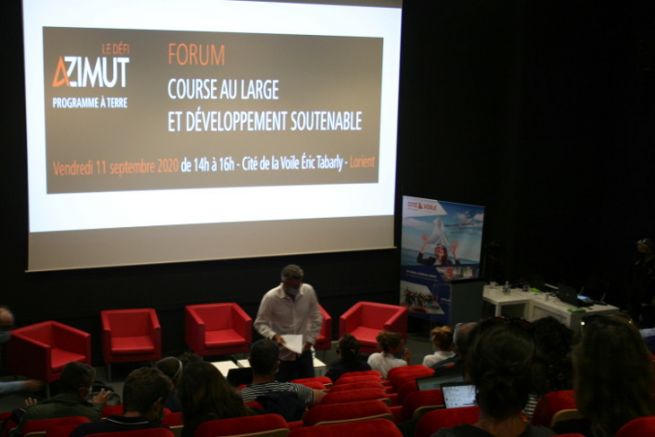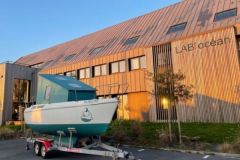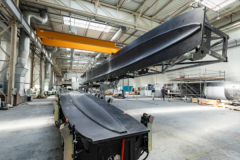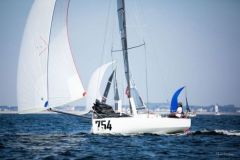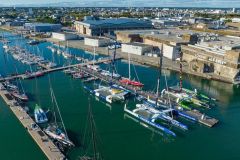Bringing together the stakeholders in ocean racing around the transition
Organised in Lorient on the occasion of the Défi Azimut, the last preparatory race for the skippers before the Vendée Globe, the Ocean Racing and Sustainable Development forum, is evidence of a growing interest in environmental issues in the competitive sailing world. A panel of 7 speakers came to share their experiences. Christophe Baley, a researcher at the University of Southern Brittany, specialising in bio-composites, gave an introduction on the difficulty of changing the way we look at objects. Is the America's Cup Class boat exhibited in front of the Cité de la Voile Eric Tabarly a magnificent boat or a plastic waste? In order to reflect on the necessary and urgent changes, he underlined the need to propose a new paradigm. The time has come to create "thought collectives", he concluded.
In this context, the La Vague movement, represented by Sébastien Guého, engineer at Gsea Design, brings its stone to the edifice. Born in February 2020, it claims about 150 people. He has led 14 workshops on the raison d'être of competitive sailing, the life cycle analysis of boats and the societal and communication stakes of the sector. An association should see the light of day, with a mode of governance defined to represent all the players in the sector. "There is a lot of work to be done to get the skippers involved, as they are the ambassadors of the projects to the public and sponsors and they vote on the class rules," emphasises Sébastien Guého.
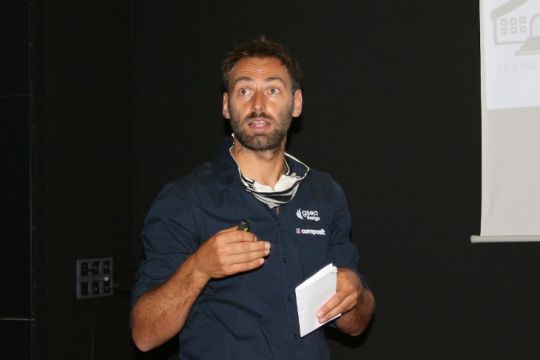
Eco-design and life cycle assessment of boats
Making boats more environmentally friendly is the first way for ocean racing to bring its "green" image more into line with the reality of high-tech boats with a significant environmental impact. The IMOCA association, in charge of the Vendée Globe class of yachts, recalls working on several areas in the latest version of the rules, including the use of alternative materials for non-structural parts, as well as life cycle analysis. "We are testing the MarineShift360 software with the CDK and Multiplast yards. Our objective is to know the carbon footprint of an IMOCA in 2021," says Imogen Dinham-Price. Some members of the audience nevertheless regret the lack of information on the software's databases and the limitation to the carbon footprint. Eco-design approaches are among the strong requests for support from companies, underline the results of a survey presented by Carole Bourlon of Bretagne Développement Innovation.
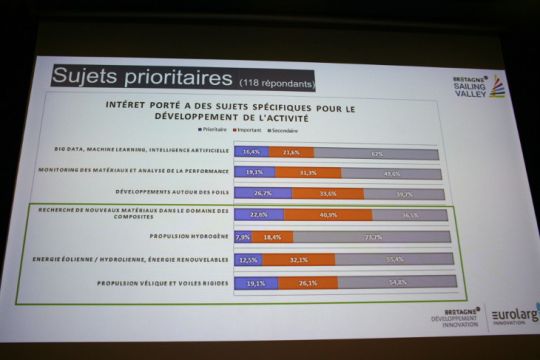
Pooling and reuse of equipment
To reduce its impact, the ocean racing industry is also working on its daily operations. Régis Guyon, from the Lorient development agency Audélor, recalls some areas of work in progress or to come, such as the pooling of equipment or RIBs, and the development of return races to avoid cargo transfers. The Give-Box initiative set up in Lorient enables ocean racing teams to offer teams with a lower budget to re-use equipment they are parting with. A reflection on digital sobriety, by limiting the number of videos transmitted, is evoked.
Necessary acceleration
Innovation is generally chaotic and non-linear," explained Emmanuel Poisson of the Explore Foundation at the forum, "it is born from the association of visionaries and practical minds. If the ingredients seem to be present, we will have to succeed in lifting the brakes on a well-established industry that its economic weight (58 Meuros in 2020 in operating costs alone) can make it frightened of brutal changes.

